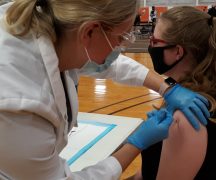The first round of coronavirus vaccinations for the highest-priority Ohioans is wrapping up.
But with supplies static and millions more in line behind them, as things stand now it will be well into the summer and possibly well beyond before non-priority Ohioans will have access to the vaccine.
Amid setbacks in producing and delivering the vaccine, Gov. Mike DeWine on Tuesday said that he doesn’t expect the weekly number of doses being delivered to the Buckeye State to increase substantially until March. That’s when the single dose Johnson & Johnson vaccine will hopefully receive regulatory approval.
Meanwhile, many of the highest-priority Ohioans — medical workers and nursing home residents and staff — are awaiting second doses, and 2.2 million are lined up behind them in Phase 1B. That group comprises people over 65, people with severe medical and developmental disorders and adult school workers.
Some back-of-the-envelope math seems to indicate that with about 100,000 doses flowing into the state each week, it will be June before that group will be vaccinated.
Ohio Department of Health spokeswoman Melanie Amato wouldn’t confirm that exact timeline, but she conceded that it’s going to be awhile before the second-highest priority group will be vaccinated.
“We don’t know what the exact month will be, but yes, we expect phase 1B to be several months long,” she said in an email.
Completion is far enough off that officials still haven’t determined who will be in the third-highest priority group. Some candidates might be police officers, service workers or prison inmates.
Until that’s determined, we can’t know how many people will be in it. But it seems likely that once it’s completed, many — if not most — of Ohio’s 11.7 million residents will still be waiting.
The incoming Biden administration has vowed to pull out all the stops; to invoke the Defense Production Act and pull other levers of federal power to dramatically ramp up vaccine production, delivery and administration.
Here’s to hoping it succeeds.
***
Also from Ohio Capital Journal:
President Biden urges a divided nation to ‘end this uncivil war’ in inaugural address
WASHINGTON — Calling on Americans to bridge the widening divisions in the country, Joe Biden became the 46th president of the United States on Wednesday, completing the peaceful transition of presidential power on the same stage where a violent mob just two weeks ago sought to prevent him from taking office.
Standing before an unusually small crowd due to the pandemic and security concerns, Biden pledged to work on behalf of all Americans, not just those who supported him. The Democrat from Delaware said those who did not vote for him can still disagree and dissent, but added: “Disagreement must not lead to disunion.”
“We must end this uncivil war that pits red against blue, rural versus urban, conservative versus liberal,” Biden said. “We can do this if we open our souls instead of hardening our hearts.”
Moments beforehand, the country witnessed a historic first, when Kamala Harris became the first woman, and first Black and South Asian woman, to serve as vice president. She was sworn in by Justice Sonia Sotomayor, the first Latina on the Supreme Court. READ MORE
State Supreme Court to decide on limits to Marsy’s Law
A law establishing the rights of crime victims will go before the Ohio Supreme Court this month to decide whether those rights have limits, particularly in a court room.
The state’s highest court will hear oral arguments in a case in which a man convicted of kidnapping and rape and sentenced to 10 years in prison said his right to a fair trial was violated when the victim was allowed to sit next to the assistant county prosecutor during jury selection.
Theodis Montgomery appealed his conviction to the Fifth District Court of Appeals, who affirmed the ruling of the trial court.
Marsy’s Law was passed in Ohio in 2017 as a constitutional amendment, and expanded the definition of a victim, to include adult parents of a child victim, for example. This allowed for an expansion of victims rights protections.
Those rights include a requirement that law enforcement, prosecutors and courts inform victims of their rights, just as they do those accused of a crime. READ MORE
HELP OHIO CAPITAL JOURNAL GROW Make a tax-deductible donation.





